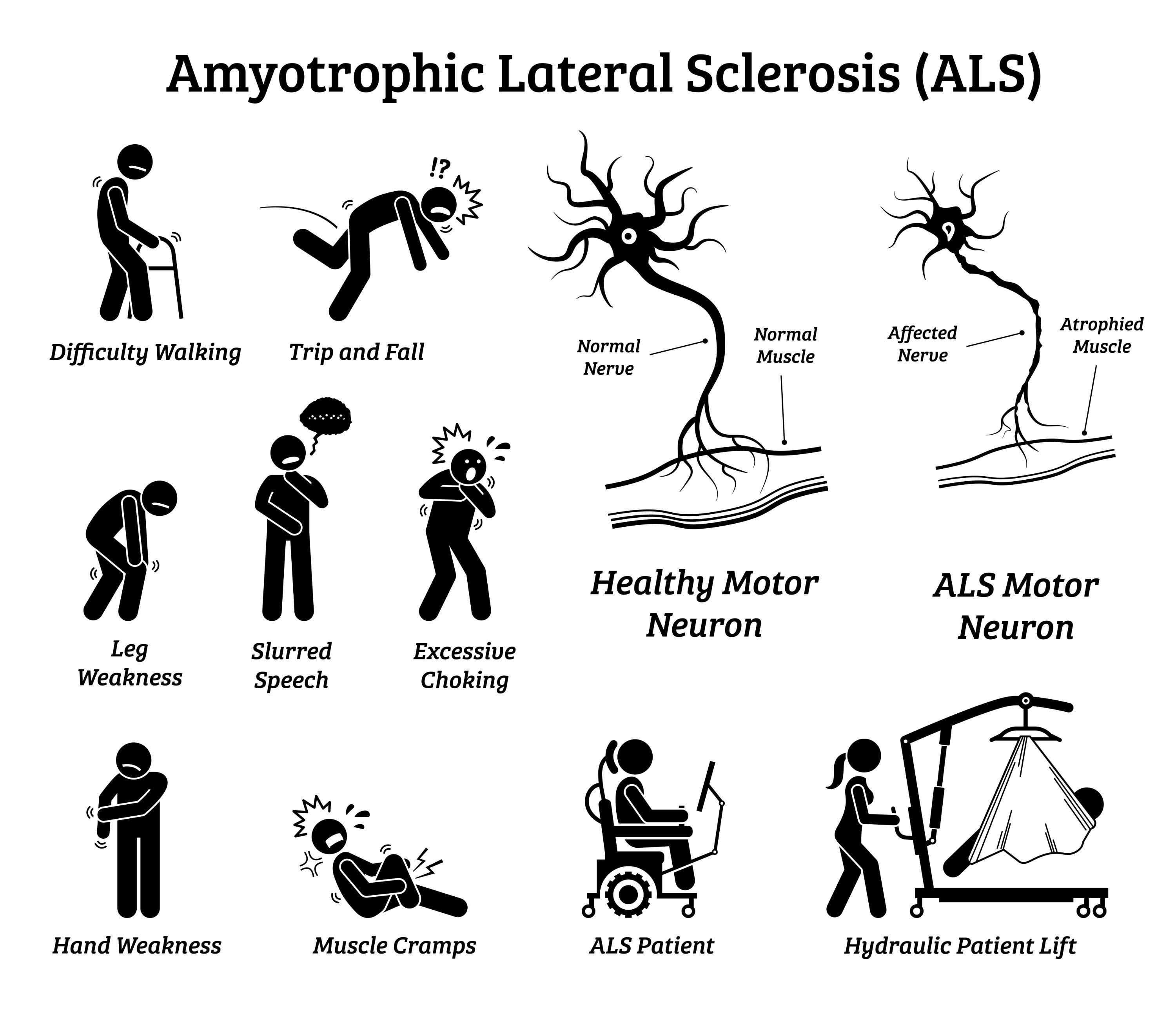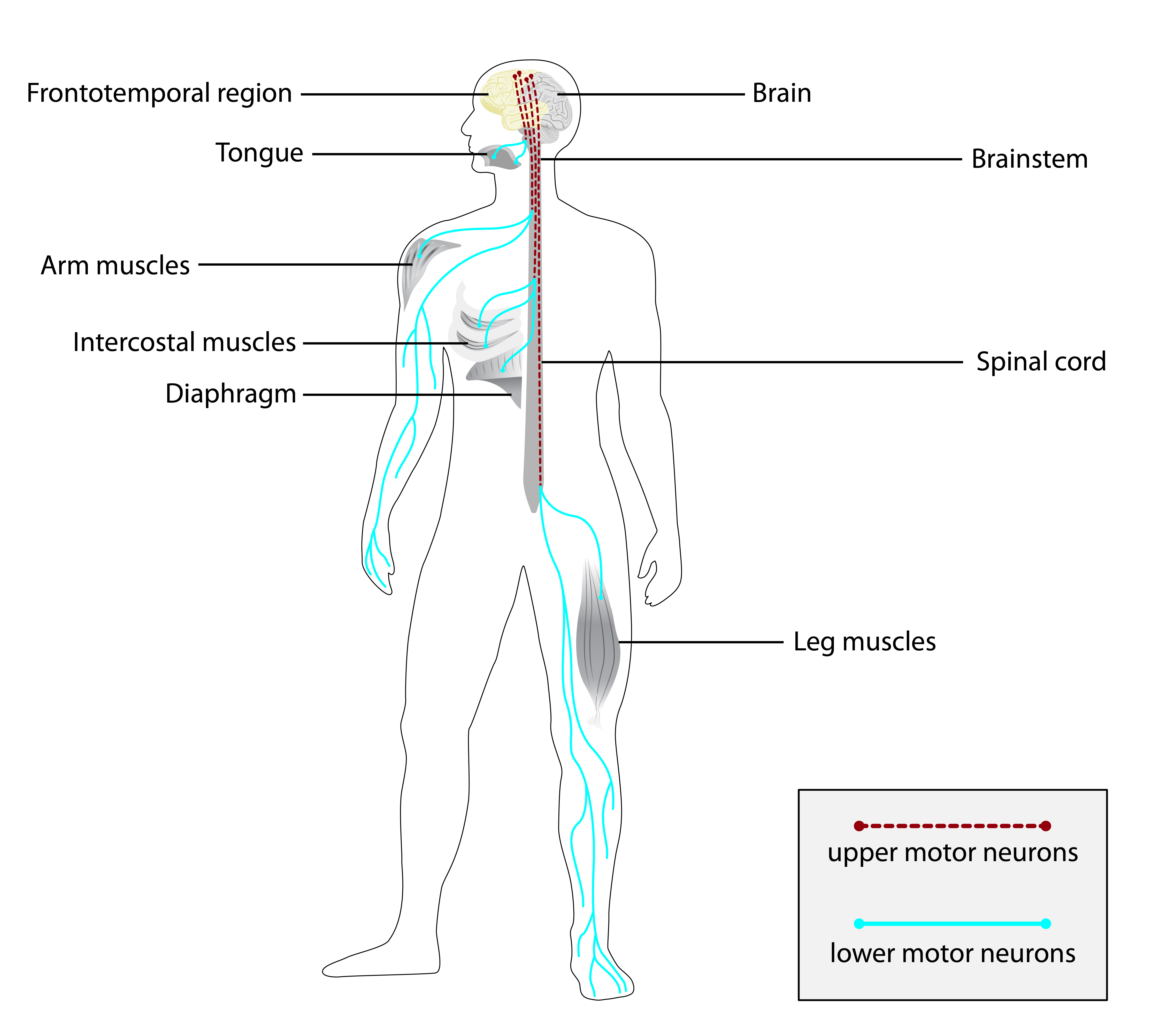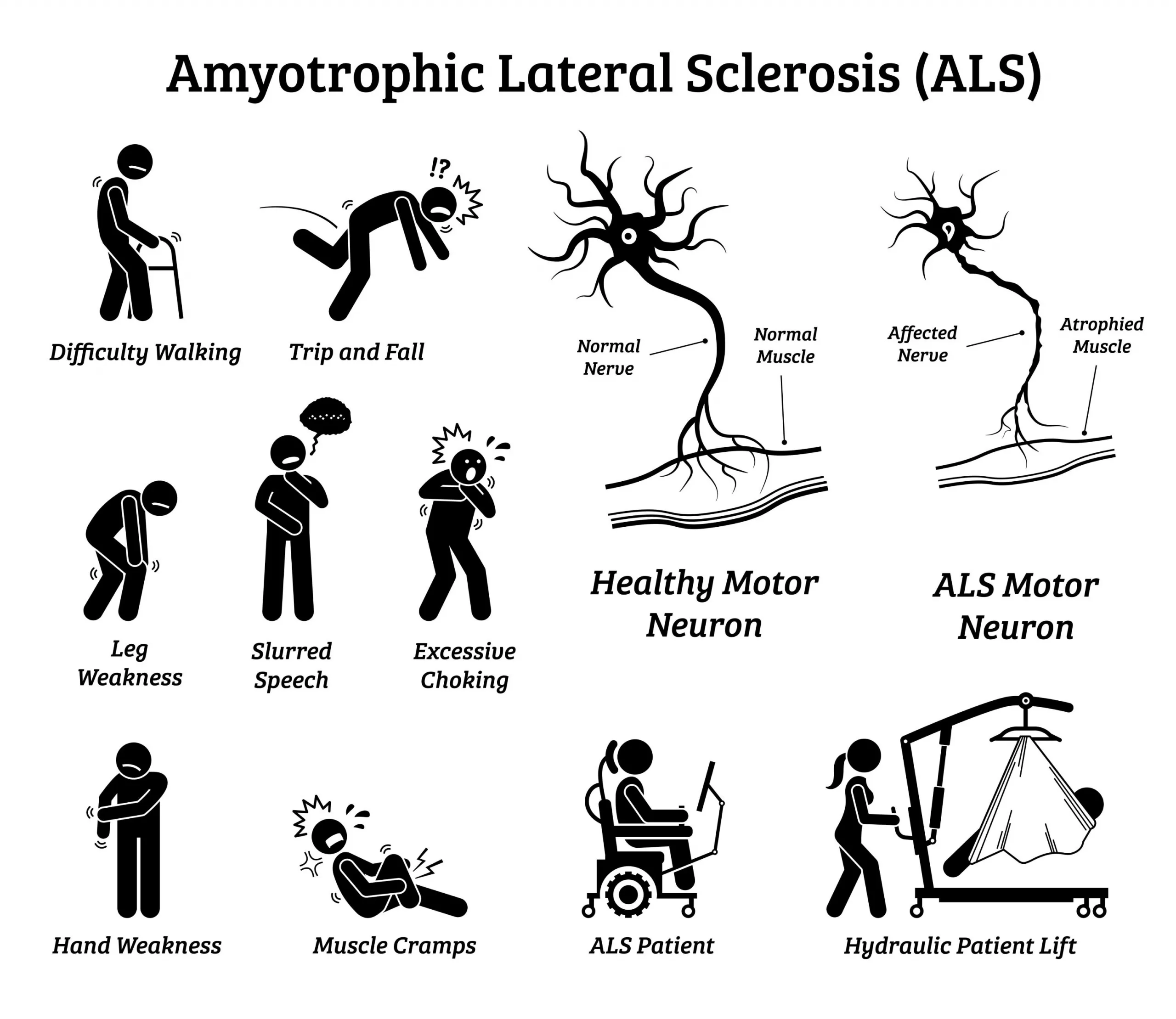Something Just Felt Off
I want to take you right to the moment things started to change—but, honestly, at the time, nothing seemed that dramatic. Just a regular jog after work, nothing out of the ordinary. Except, about five minutes in, my breathing got weirdly heavy and… was that a twinge in my back? “Maybe I’m just out of shape,” I told myself. Maybe you’ve had those days too—where a new ache or a little extra fatigue just feels like life piling on.
So here’s the deal: My first ALS symptoms didn’t announce themselves with a big bang. There was no “Ta-da! Pay attention!” moment. It was more like a collection of strange little whispers. Easy to ignore, easier to rationalize. And honestly—if you’re anything like me—you get pretty good at telling yourself, “It’s probably nothing.”

Those Annoying, Sneaky Quirks
Let’s talk about the small stuff. The stuff you’d probably never mention to your doctor at first. You know when you fumble your keys once, maybe twice, and laugh it off? That’s exactly what I did. One day I dropped my coffee mug (RIP favorite mug) and called it “Monday Brain.” But then I started tripping over the edge of carpets. Not falling, just stumbling. You know that feeling when your toe catches and you do that awkward little dance to stay upright? It became my new normal. At first it was funny, but then it wasn’t.
Are You Just Clumsy… Or Is It More?
I can almost hear you—because I did it too—thinking: “Everyone drops things. Big deal.” But here’s the thing: when dropping things becomes something you notice, when you get the sense that your grip just isn’t what it was… that’s a flag worth pausing for. According to the ALS Association, progressive muscle weakness—usually starting out pretty mild—is one of the most common early signs of ALS. It’s often painless and… sneaky. For me, it started in my hands and legs, but someone else might notice it first in the way their voice sounds or how their jaw feels after chewing for a while according to their symptom guide.
Normal Fumble Or Red Flag?
| Everyday Oops | Persistent Clues |
|---|---|
| Tripped once sprinting after the bus | Frequent tripping over nothing in particular |
| Dropped a mug after a sleepless night | Regularly losing grip on light objects |
| Feeling wiped out after a tough week | Ongoing, unexplained muscle fatigue |
If you’re a woman—heads up. Early signs of ALS in Females can be even harder to pin down. Some women notice changes in fine motor control (like doing up buttons or jewelry clasps) before the bigger stuff. I wish I’d known that then.
Muscle Twitches: The Annoying Party Trick
It started as little, random twitches in my calves and shoulders. You know, that odd flickering feeling, almost like your muscles are having a tiny dance party under your skin. At first, it felt kind of funny. “Just dehydrated,” I thought, gulping water and eating bananas like they were going out of style.
Should You Worry About Twitching?
The truth is, lots of people get occasional muscle twitches—sometimes from exercise, sometimes from stress or being up too late watching bad TV. The thing that made mine different was that they stuck around. Some evenings, it was like my body was trying to send me a Morse code I just couldn’t decode.
Here’s what I wish I’d known: Persistent twitching (especially when it comes with new weakness or clumsiness) is worth chatting about with your doctor. Early ALS symptoms can be subtle, like muscle cramps or fasciculations (that’s the science word for twitches), but when they don’t let up…that’s a sign. According to research on very early ALS symptoms, the combo of twitching and a decline in muscle strength is something neurologists like to see for a reason to investigate further based on guidelines from ALS United Greater NY.
Real Talk: Stories from Others
An old friend from my running group used to make jokes about her “twitchy runner’s legs.” She ignored them until socks got harder to put on because her foot started slapping the ground instead of stepping normally. Her story sounds a lot like many in My first ALS symptoms patient stories—so similar you’d think we all copied off each other, except none of us knew what we were looking for until much later.

Breathlessness That Just Won’t Quit
You know those days when just climbing stairs leaves you out of breath, and you figure—hey, maybe it’s allergies or just getting older? That was me. But then it started happening on the flat, walking across a room. On one particularly embarrassing occasion, I nearly had to ask my four-year-old nephew to slow down so I could keep up on the walk to the kitchen. (He didn’t, of course. Kids never do.)
When Breathlessness Becomes Concerning
The sneaky part about ALS? Sometimes it impacts the muscles that control your breathing or speech pretty early on—just enough to notice, not enough to sound alarm bells immediately. I’d find myself short of breath in conversations, almost like my lungs were taking coffee breaks without me. According to Johns Hopkins, for some people, the first symptom is slurred speech or difficulty swallowing rather than limb weakness at all based on their ALS breakdown.
Sometimes, small differences are key. If you’re noticing that what used to feel like normal effort is now…well, hard, don’t brush it off. Especially if it’s hanging around for weeks, not just a lazy Sunday.
Exercise Fatigue vs. Possible ALS Fatigue
| Just Out of Shape | ALS-Type Fatigue |
|---|---|
| Out of breath after tough workout. Recovers quickly. | Shortness of breath from light activity. Lingers longer. |
| No real muscle weakness—just tired. | Legs feel weaker, less stable. Everyday tasks start to require effort. |
| Respiratory symptoms disappear after rest. | Breathlessness persists, sometimes even at rest. |
It’s amazing how quickly you can go from, “I need to do more cardio,” to “Wait, am I actually getting weaker?”
Navigating The Diagnosis Maze
Here’s the part nobody tells you: most people don’t get diagnosed at their first doctor visit. For me, it was a parade of appointments—general practitioner, neurologist, then a battery of tests. ALS doesn’t have one magic blood test or quick scan. It’s more like… a process of elimination, ruling out all the obvious stuff (and some of the weird and scary stuff you’ve never even heard of). The ALS Association confirms this, saying diagnosis happens after ruling out everything else and doing a mix of nerve and muscle tests according to their diagnostic overview.
Is It Just Aging, Or Something More?
The uncertainty does a number on your head, I’ll be real with you. I spent a lot of nights Googling (don’t do this, it’s a spiral), swinging between “It’s all in my head” and “Why me?” I didn’t want to worry anyone, but the longer I waited, the more little things added up. Instead of “blips,” they became a pattern. Have you ever played that game, seeing what’s different between two photos? Suddenly, it was like my “photo” from last year and this one didn’t quite match up anymore.
One of the most frustrating bits? For women, especially, some early ALS symptoms can mimic other issues—carpal tunnel, pinched nerves, even stress. That’s why resources like Early signs of ALS in Females matter so much. More information means a better shot at catching ALS early, or at least nudging your doctor to dig a little deeper if things aren’t improving.
Testing: Not As Scary As I Feared
The tests themselves? Honestly, the scariest part is waiting for answers. Electromyography (EMG) and nerve conduction studies sound intimidating and—okay—nobody loves needles, but the actual process wasn’t horrible. (Ask for the funny nurse if you can.) You’re basically checking if your nerves and muscles are “talking” to each other the right way. In my case? They were not.

One thing’s for sure: no matter the diagnosis, having real stories and other patients’ voices around you helps. Reading My first ALS symptoms patient stories felt like being let in on a secret club I never wanted to join… but needed more than I knew.
What This Disease Taught Me
Getting that ALS diagnosis sucked—let’s not sugarcoat it—but it also snapped my priorities into focus. I had to learn new ways to move, talk, even to ask for help (yes, I’m stubborn). The medical team at Cedars-Sinai’s ALS Clinic became a lifeline. Adaptive tech, therapy tricks, support groups—it’s not just science, it’s survival. I’m using a walker now, but it doesn’t mean I’m not living.
How Do You Move Forward?
Here’s the most unexpected thing: ALS, for all its heartbreak, made me weirdly grateful. I spend more time with family. I laugh at stuff I used to grumble about (like tricky jar lids—seriously, who invented those?). Little victories become a big deal. If you’re reading this and nodding along to any of these symptoms… be brave enough to check it out sooner rather than later.
Finding A New “Normal”
I revamped my gym routine at home. Swapped burpees for seated stretches. Traded solo struggle for team effort. Turns out, the people who love you want to help—go figure, right?
| Before Diagnosis | After Diagnosis |
|---|---|
| Pushing hard, ignoring the pain | Pacing myself, celebrating every win |
| Solo workouts, “just do it” mentality | Working out with friends, open about struggles |
| Annoyed by limitations | Accepting support, giving myself grace |
Some days are better than others. That’s okay.
Last Thoughts (And a Little Hope)
Look, none of us want to be experts at noticing our own decline. But my first ALS symptoms—aches in my back, breathlessness, those unpredictable twitches—were messengers, not enemies. They bought me time to adjust, to advocate for myself, and to connect with resources and people who “get it.” If you’re noticing something that doesn’t feel right—especially if it sticks around, or gets in the way of your day-to-day—let this be your gentle push to talk to your doctor. Early action really can make a difference, whether it’s ALS or something totally fixable.
The more we share our stories—messy, honest, and yes, imperfect—the more power we take back from a disease that loves to isolate. Want to hear how others handled those moments of “what the heck is happening to my body?” Go check out My first ALS symptoms patient stories. And if you’re wondering how these symptoms show up differently for women, there’s help in Early signs of ALS in Females too.
No robotic pep talk here—just real talk: Listen to your body, lean on your people, and never be afraid to demand answers sooner. Comment below or hit me up if you’re feeling lost and want to chat. You’re not alone in this.


















Leave a Reply
You must be logged in to post a comment.